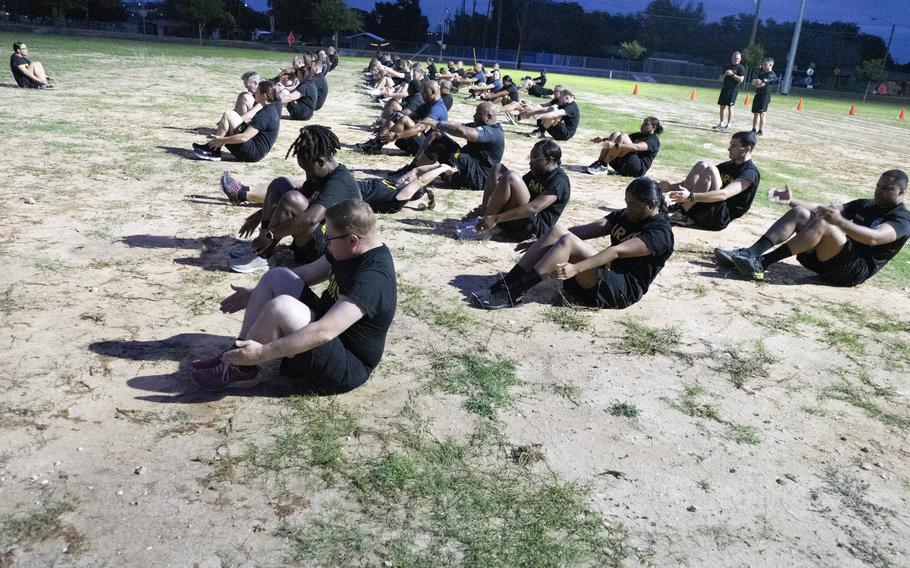
Soldiers from the 120th Infantry Brigade participate in the Army Combat Fitness Test to improve overall fitness on Nov. 8, 2023, at Fort Cavazos, Texas. (Liliuokalani Thomas/U.S. Army)
The Army must raise its combat fitness testing standards for its most-demanding, frontline fighting jobs, Congress directed in legislation passed by both chambers last week.
The 2024 National Defense Authorization Act directs the Army to implement “higher minimum standards” for some combat troops on its Army Combat Fitness Test within 18 months of the bill’s enactment. President Joe Biden is expected to sign the bill, which sets Congress’ annual policy and spending priorities for the Pentagon, in the coming days.
The legislation directs higher fitness standards for soldiers in the infantry, combat engineering, armor and cavalry, artillery forward observers, engineer and artillery officers and for all Special Forces soldiers.
It does not provide specific details about how much higher those combat soldiers should score on the assessment than their peers. The bill also requires the Army to brief Congress in one year about its progress on the scoring standards.
The Army spent years developing the ACFT in an effort to better link its physical fitness test and training to the rigors of combat. In October, after multi-year delays implemented by lawmakers, the Army officially implemented the six-event CrossFit-style ACFT.
The test replaced the 1980s-era Army Physical Fitness Test, or APFT, which tested soldiers on push-ups, sit-ups and a two-mile run.
Around 2010 as major combat operations were ongoing in Iraq and Afghanistan, top Army leaders began planning for a more rigorous fitness evaluation. They believed the decades-old APFT placed too much emphasis on a soldier’s running ability and did not adequately gauge a service member’s ability to perform critical functions in combat, such as heaving heavy equipment or dragging a wounded trooper to safety.
The new law will bring the Army back in part to its original intent when it rolled out the ACFT in 2018.
It was to be a gender- and age-neutral fitness assessment with scoring tiers based on the physical demands of an individual’s job.
The Army eventually developed different standards for men and women, facing pressure from Congress after studies showed fewer than half of female soldiers were passing early versions of the test.
The 2024 NDAA was a compromise solution after both chambers passed initial versions of the bill with competing plans for the ACFT.
The House proposed returning gender-neutral standards for the test. The Senate proposed doing away — at least temporarily — with the ACFT in favor or returning to the APFT.
Senior Army leaders pushed against stripping the service of the ACFT even temporarily, saying the new test has helped the service improve musculoskeletal injury rates and improve its fitness culture.
The ACFT has “really been a critical tool for us in the entire holistic health and fitness arena to change the culture of fitness,” Sgt. Maj. of the Army Michael Weimer, the service’s top enlisted soldier said at Fort Moore, Ga., in September. “This is direct to warfighting. And, so, I look forward to taking a whole bunch of ACFTs.”
After the test changed several times during its development and implementation, the final version of the ACFT includes a dead lift, hand-release pushups, a plank, a medicine ball throw, a sprint-drag-carry event, and a two-mile run.